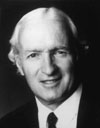| Australia–Indonesia Institute Chairman, Mr Phillip Flood AO |
The year 2001–2002 involved a wide range of activities through which the Australia–Indonesia Institute (AII) continued to build people-to-people links between Australia and Indonesia and promoted greater mutual understanding and tolerance. The Institute has sought to achieve a healthy balance between innovation and continuity in its activities over the year. In view of the ongoing significant changes to IndonesiaÂs political, economic and social environment, the InstituteÂs work remained an important adjunct to the Australian GovernmentÂs management of bilateral relations.
A major objective of the Institute has been to take an initiative to promote greater understanding of the role of Islam in Indonesia and to ensure a greater awareness in Indonesia of Islamic communities in Australia. The Board has approved a three-year program of ÂMuslim Exchanges under which emerging Muslim leaders from both Australia and Indonesia will visit one anotherÂs countries to meet Islamic leaders, but also other religious, ethnic and community groups. The first exchanges will take place in October this year. This will promote constructive interchange of ideas for better relations not only between Australia and Indonesia, but also between Muslims and non-Muslims in each country. This initiative was particularly welcomed by President Megawati and the Prime Minister Mr John Howard during Mr HowardÂs visit to Indonesia in February.
Among the InstituteÂs core activities the Youth and Education program continued to be the InstituteÂs largest, accounting for around one-third of program funds in 2001–2002. The Institute supported another highly successful Australia Indonesia Youth Exchange Program (AIYEP) and produced a revised version of the Geografi Australia textbook. It also introduced the Herb Feith Scholarship for students to undertake a Masters program in Conflict Resolution Studies at Gadjah Mada University. The Board has continued to provide support to the Australian Alumni Association of Indonesia (IKAMA) to help develop its database and other tools for tracking membership.
Under its Arts and Sport program, the Institute supported initiatives promoting appreciation of the quality and diversity of the visual and performing arts in the two countries. Indonesian poets and film producers were sponsored to visit and demonstrate their work in Australia, and Australian artists were given the opportunity to teach and learn in Indonesia under the Asialink Arts Residences. A successful festival of Australian films was held in Jakarta. With respect to sport, the Institute funded a project to encourage participation in volleyball in Indonesia.
Media relations, Australian studies and the professions also received strong support from the Australia–Indonesia Institute. The Institute has maintained its program of Journalist Scholarships and continued the development of Australian studies resources online. Another particularly worthwhile project which also demonstrated the diversity of the AIIÂs work, involved support for HIV patient care in Bali.
In April 2002, the Institute held one of its tri-annual board meetings in Makassar, South Sulawesi. Makassar has long historic ties with Northern Australia and Board members received a warm and enthusiastic reception. The Board met the South Sulawesi Governor and other officials and helped launch the Makassar Branch of the Australian alumni association (IKAMA). In the past year, the Institute has funded a language reference centre in Makassar and student exchanges between schools in South Sulawesi and Australia.
During its visit to Indonesia the Board also travelled to Jakarta, meeting President Megawati Soekarnoputri, Ministers, officials, Australian alumni and civil society leaders. The Board was delighted with the high level of access it received. Interlocutors strongly supported the work of the Institute. The President welcomed the AIIÂs initiative to communicate the moderate nature of Indonesian Islam.
In 2001–2002 the Institute again received a large number of creative and innovative project proposals. One noteworthy example was the Australia–Indonesia Young Leaders Dialogue held in Bogor which was announced by the Prime Minister and attended by the Australian and Indonesian Foreign Ministers. Although the InstituteÂs modest budget can fund only a small number of total applications received, the quality and diversity of proposals reflects the strong desire among many for friendly ties between the peoples of our two countries.
I am grateful for the support and advice we have continued to receive from other Government agencies. We have had a very productive relationship with the Australian Agency for International Development (AusAID) and the Department of Education Science and Training (DEST) in particular and have been able to refer some proposals received to these and other agencies for assistance.
I began my term as Chairman on 25 November 2001 and I wish to pay tribute to the outstanding contribution of my predecessor Mr John Reid AO whose vast knowledge and long experience of Indonesia was of immense benefit to the Institute. During the year it was a pleasure to welcome Professor Virginia Hooker and Mr Robert Champion de Crespigny as new members of the Board. Both are respected figures in their fields who bring great knowledge and unique expertise to the Board. I wish to thank Professor Russell Trood for his invaluable contribution to the Board.
Finally, I note the valuable advice and administrative assistance that the Board has received from the Secretariat and the Cultural Counsellor in Jakarta. The Board especially appreciated the enthusiastic support and close involvement in many Institute activities of Ambassador Ric Smith in Jakarta.
Philip Flood AO
Chairman

